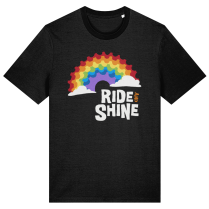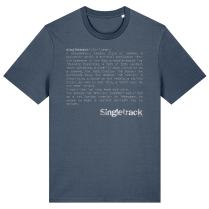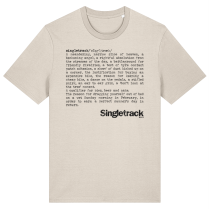Columnist Mildred Locke addresses those who would say ‘stick to bikes, keep politics out of it’ – she thinks bikes are political.
Following my last column, there’s another phenomenon I want to delve into. Beneath almost every racism-related post from a cycling brand or publication lurks a noisy minority, outraged by the intrusion of ‘politics’ into their social media feed.
With the announcement of Castelli’s limited edition BLM jersey, some vowed to boycott the brand, stating ‘I didn’t come here for politics’. It happened when Specialized shared a photo of Rachel Olzer, a brand ambassador, drinking coffee in front of a BLM mural: they were essentially told to stay in their lane. Meanwhile, when Surly shared an interview with Wesley Ferguson about the reality of being a Black man in the cycling world, some commenters urged them to ditch the ‘woke agenda’ and stick to posting about bikes.
Plus, anyone who follows cycling-related brands and publications on social media would be hard pressed to avoid hearing about the current controversy surrounding Trek and its financial ties to police brutality in the US.
Latest Singletrack Merch
Buying and wearing our sustainable merch is another great way to support Singletrack
I find it fascinating that so many people see cycling as an insular hobby that should remain unaffected by the outside world. As Skin from Skunk Anansie has screamed on many occasions, “everything’s political” and it’s not that easy to escape.
As I pointed out in my last column, the misunderstanding of cycling’s race problem derives from large groups of – predominantly white – people, never experiencing racial discrimination and living in a bubble that protects them from the realities of socioeconomical disparity. Since BLM is about fighting for equal rights, and literally means the difference between life or death for millions of people, to be able to dismiss it as something irrelevant to walk away from is a huge privilege that for the most part comes with being white.

So while you might feel entitled to escape into your social media feed and simply enjoy looking at beautiful bikes, trails and kit, doing so leaves you in a bubble of ignorance that is harmful to others whose very safety in the outdoors is under question at all times. In many cases the reason it finds its way into your ‘bikes only’ feed in the first place is because folks affected by racial discrimination are in need of allies to help make the changes needed. It baffles me how people can feel so offended by this.
Perhaps to you, cycling is just something you do for a few hours, loading your bike into your lifestyle van, driving to the trails, and driving back again. But there’s actually a whole other world out there with cycling at its centre. For many people it’s a livelihood, their only means of getting from place to place – particularly if they need it as a mobility aid – or their only means to escape isolation and be part of a community. For many, bikes are a vehicle for social change.
The fact is, bikes have always been political. From the emancipation of (white, upper-class) women and the socialist movement at the turn of the 20th century, to the ‘Stop de Kindermoord’ protests in 1970s Netherlands and photos of flattened bicycles in the wake of the 1989 Tiananmen Square Massacre. The bicycle is an emblem of freedom, offering people from all walks of life the opportunity to go to new places, learn new skills, earn a living, and access things that might otherwise be out of reach. It’s no wonder that their history has been so tied up in social movements.
In the present day bicycles are used as tools of protest throughout the world, and not just for racial equality. Cities on a global scale have Critical Mass rides, where large groups of cyclists take to the streets to take up space and demonstrate their right to be there. They continue to be a tool of everyday protest for environmentalists who oppose the overuse of single-occupancy vehicles, as well as a symbol of the importance of the ‘common man’ for India’s Samajwadi Party. Even ghost bikes engage in politics. They’re placed at the site of a cyclist’s death as a memorial, but they also serve to display to passers by how vulnerable cyclists are on the road.
You can try to ignore politics if you like, but politics doesn’t ignore you. Politics is unavoidable because it affects everything and everyone, from the food you eat, the medicines you take, the water you drink, and the land you cycle on. It affects the brands who manufacture the components you need, and the tech you love, as well as the accessibility to trails and the changing natural landscape. It’s never irrelevant.
The most important point I can make here, though, is that politics does not detract from your enjoyment of the sport. For one thing, nothing stops you from choosing not to read a certain article, or click a particular link. If you don’t like it, scroll on. But if you can bring yourself to actually engage with the conversations taking place, you may make new connections with people you otherwise never would have encountered, making your experience all the richer.





“she thinks bikes are political.”
… and she is fully entitled to such opinion, however my one is ride more, make less politics, as it stinks, no matter what side of the spectrum you are.
That is my opinion, that I’m fully entitled to have.
Cheers!
I.
Here’s to remembering that cycling exists as part of a broader ecosystem. The only way we get wider acres to trails is through politics. You might not like what the political class has become but you ignore it at your peril.
Okay, I read the Grauniad & it’s American edition, the Daily Mail, The Telegraph & Private Eye. – that’s plenty of politics to read. I really can’t see the point in having this political stuff in a cycling mag. Just not the place & surely just a bit of a baffling rant to most of us. Please stick to bikes.
With the greatest respect to your magazine and your contributors, I must take issue with the comment that to not view my enjoyment of my hobby through the prism of a political bias/issue would leave me “in a bubble of ignorance that is harmful to others”. I didn’t see The Economist’s review of the new DMR pedals this week and that’s because they stay within their lines.
I subscribe to your magazine for information about my hobby, I subscribe to The Economist for informed news and opinion on current affairs.
If your contributors feel strongly that they need to express their views or try to bias my views of any current affairs perhaps they should submit a piece to the Economist.
I pay money to you to hear news about bikes, “Please stick to bikes”.
That’s a big up from me Mildred. Stick to your ‘guns’.
Disappointing that the many of the first few responses on here don’t seem to have read (or understood) the article they’re replying to.
The rights of everyone to be treated equally isn’t a political issue. It’s a human rights issue.
That’s why it is (quite rightly) being spoken about in all aspects of life.
Maybe the Economist should run a few more articles on why the leadership of most FTSE100 companies is white men – and what should be done about it?
I think they should, and I think Singletrack should continue to run articles like this too.
Its ironic, but not at all surprising, that a thoughtful article about some of the wider issues faced by our sport which decries the “I don’t come here for politics” attitude has half the comments below the line saying exactly that.
I guess if you lack the self awareness to appreciate broader issues then you probably also lack the attention span to read beyond the headline of an article.
… and that is what makes current life on so many levels so polarized.
I say I want bikes, not politics and next thing I’m learning is that I’m shallow, probably stupid, more than likely racist and possibly some more.
In the best spirit of “tolerance and understanding” once again we managed to divide for “us” and “them”.
Cheers!
I.
Well, I have always been a vegan cyclist socialist, and a bike mechanic for around 15 years anyway. For me, bikes have first and foremost been about freedom and politics.
So full support from me, Singletrack.
Keep it up. The reason I use this site and subscribe to the magazine is because it veers away from the normal “all about the bikes” format and goes more into lifestyle. I can read reviews anywhere. The wider view is what makes Singletrack great
great keep this up singletrack! and as an aside if you don’t want to read about politics don’t click on the article